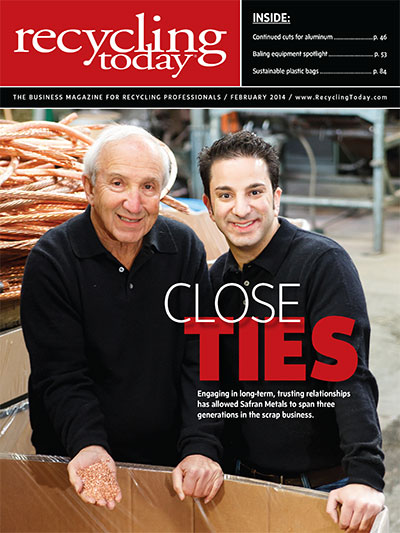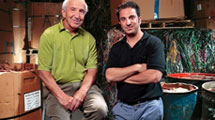News & Press
-
Recycling Today

Close Ties - Engaging in long-term, trusting relationships has allowed Safran Metals to span three generations in the scrap business.
Successful scrap recycling company owners usually have no shortage of opportunities to sell their companies to willing buyers or to manage their companies for aggressive growth in a fashion that renders those companies vulnerable during a downturn.
Members of the Safran family have faced those very opportunities and challenges for three generations; but, as 2014 gets underway, Safran Metals is retaining its place as a midsized wire chopper and nonferrous scrap recycler on Chicago's North Side.
The leadership team guiding Safran Metals consists of a combination of family members and long-time employees who are considered to be family. The team includes both gray-haired industry veterans and younger managers who plan to guide the company well into the 21st century.
What all the company's leaders have in common is placing the highest priority on long-term relationships and earning and maintaining the trust of customers, employees and each other.
Understanding the craft
Safran Metals was founded by the late Paul Safran, father of current President Steven Safran and grandfather of the company's current Vice President and Chief Operating Officer Todd Safran.
Before arriving in the United States from Germany in 1939, Paul went through an apprentice program in scrap metal when he was 15 years old, says Steven. "How or why he chose that, I wish I could ask him," he comments.
Paul "worked for other people and even started his own company in Germany," says Steven, but he left for the U.S. at age 31 as the oppressive climate of persecution in Germany continued to grow worse.
"When he came here, he started working for Federated Metals of East Chicago, Ind., as a metals sorter. He didn't speak much English, but he soon started trying to teach them what was worth sorting," says Steven of his father's early years in the U.S. scrap business. "They didn't like a greenhorn who didn't speak much English telling them what to do," he adds.
Feb. 2014
Read the full article -
Recycling Today

Specialty processors continue to produce high-quality copper and aluminum scrap from discarded wire and cable.
Sufficient scrap volumes have been difficult to come by for recyclers in almost every sector the past few years, and wire and cable processors have not been an exception. The lack of construction activity and other factors that have caused generation to be lackluster means competition for material is severe as North American processors struggle against one other and the export market.
Several years ago, the demand from China for baled wire and cable was causing some observers to wonder whether wire chopping in North America was going to become increasingly rare.
The combination of export demand and reduced scrap generation has indeed claimed some companies as victims, but several entrepreneurs and established processors also have gotten into the game even during the economic downturn.
Oct. 7, 2013
Read the full article -
Crain's Chicago Business
Jun. 15, 2013

Crain's looks at the scrap metal supply chain - from the metal collectors to the refineries to the fabricators.
Read the full article -
Crain's Chicago Business

China's reach into Chicago's alleyway economy.
"In slow times everybody is now fighting for the material," says Todd Safran, chief operating officer of Safran Metals Inc., a midsize copper scrap yard near Chicago's Goose Island. "Our piece of the pie is not getting any larger out there. If anything, it's getting smaller."
May 27, 2013
Read the full article